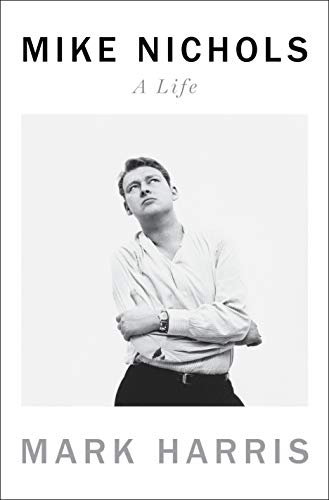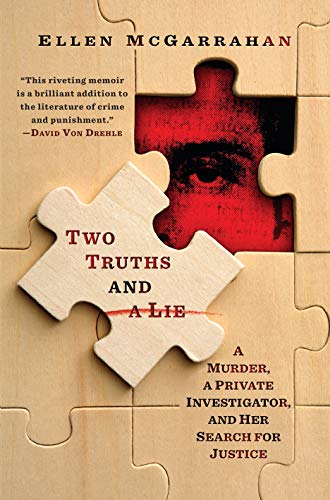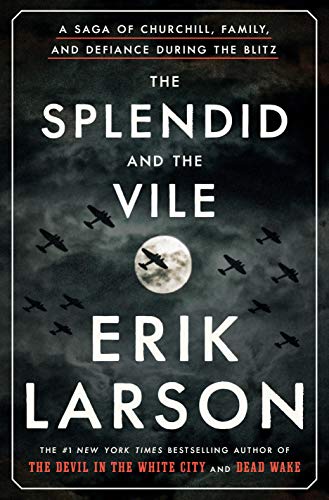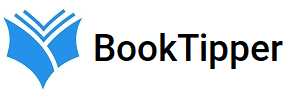
MIKE NICHOLS: A LIFE
by Mark Harris
A magnificent biography of one of the most protean creative forces in American entertainment history, a life of dazzling highs and vertiginous plunges–some of the worst largely unknown until now–by the acclaimed author of Pictures at a Revolution and Five Came Back
Mike Nichols burst onto the scene as a wunderkind: while still in his twenties, he was half of a hit improv duo with Elaine May that was the talk of the country. Next he directed four consecutive hit plays, won back-to-back Tonys, ushered in a new era of Hollywood moviemaking with Who’s Afraid of Virginia Woolf?, and followed it with The Graduate, which won him an Oscar and became the third-highest-grossing movie ever. At thirty-five, he lived in a three-story Central Park West penthouse, drove a Rolls-Royce, collected Arabian horses, and counted Jacqueline Kennedy, Elizabeth Taylor, Leonard Bernstein, and Richard Avedon as friends.
Where he arrived is even more astonishing given where he had begun: born Igor Peschkowsky to a Jewish couple in Berlin in 1931, he and his younger brother were sent to America on a ship in 1939. The young immigrant boy caught very few breaks. He was bullied and ostracized–an allergic reaction had rendered him permanently hairless–and his father died when he was just twelve, leaving his mother alone and overwhelmed.
The gulf between these two sets of facts explains a great deal about Nichols’s transformation from lonely outsider to the center of more than one cultural universe–the acute powers of observation that first made him famous; the nourishment he drew from his creative partnerships, most enduringly with May; his unquenchable drive; his hunger for security and status; and the depressions and self-medications that brought him to terrible lows. It would take decades for him to come to grips with his demons. In an incomparable portrait that follows Nichols from Berlin to New York to Chicago to Hollywood, Mark Harris explores, with brilliantly vivid detail and insight, the life, work, struggle, and passion of an artist and man in constant motion. Among the 250 people Harris interviewed: Elaine May, Meryl Streep, Stephen Sondheim, Robert Redford, Glenn Close, Tom Hanks, Candice Bergen, Emma Thompson, Annette Bening, Natalie Portman, Julia Roberts, Lorne Michaels, and Gloria Steinem.

THINK AGAIN
by Adam Grant
“Think Again is a must-read for anyone who wants to create a culture of learning and exploration, whether at home, at work, or at school… In an increasingly divided world, the lessons in this book are more important than ever.”
–Bill and Melinda Gates
The bestselling author of Give and Take and Originals examines the critical art of rethinking: learning to question your opinions and open other people’s minds, which can position you for excellence at work and wisdom in life
Intelligence is usually seen as the ability to think and learn, but in a rapidly changing world, there’s another set of cognitive skills that might matter more: the ability to rethink and unlearn. In our daily lives, too many of us favor the comfort of conviction over the discomfort of doubt. We listen to opinions that make us feel good, instead of ideas that make us think hard. We see disagreement as a threat to our egos, rather than an opportunity to learn. We surround ourselves with people who agree with our conclusions, when we should be gravitating toward those who challenge our thought process. The result is that our beliefs get brittle long before our bones. We think too much like preachers defending our sacred beliefs, prosecutors proving the other side wrong, and politicians campaigning for approval–and too little like scientists searching for truth. Intelligence is no cure, and it can even be a curse: being good at thinking can make us worse at rethinking. The brighter we are, the blinder to our own limitations we can become.
Organizational psychologist Adam Grant is an expert on opening other people’s minds–and our own. As Wharton’s top-rated professor and the bestselling author of Originals and Give and Take, he makes it one of his guiding principles to argue like he’s right but listen like he’s wrong. With bold ideas and rigorous evidence, he investigates how we can embrace the joy of being wrong, bring nuance to charged conversations, and build schools, workplaces, and communities of lifelong learners. You’ll learn how an international debate champion wins arguments, a Black musician persuades white supremacists to abandon hate, a vaccine whisperer convinces concerned parents to immunize their children, and Adam has coaxed Yankees fans to root for the Red Sox. Think Again reveals that we don’t have to believe everything we think or internalize everything we feel. It’s an invitation to let go of views that are no longer serving us well and prize mental flexibility over foolish consistency. If knowledge is power, knowing what we don’t know is wisdom.

ANIMAL, VEGETABLE, JUNK
by Mark Bittman
From hunting and gathering to GMOs and ultraprocessed foods, this expansive tour of human history rewrites the story of our species—and points the way to a better future.
The history of Homo sapiens is usually told as a story of technology or economics. But there is a more fundamental driver: food. How we hunted and gathered explains our emergence as a new species and our earliest technology; our first food systems, from fire to agriculture, tell where we settled and how civilizations expanded. The quest for food for growing populations drove exploration, colonialism, slavery, even capitalism.
A century ago, food was industrialized. Since then, new styles of agriculture and food production have written a new chapter of human history, one that’s driving both climate change and global health crises. Best-selling food authority Mark Bittman offers a panoramic view of the story and explains how we can rescue ourselves from the modern wrong turn.

THE DATA DETECTIVE
by Tim Harford
From “one of the great (greatest?) contemporary popular writers on economics” (Tyler Cowen) comes a smart, lively, and encouraging rethinking of how to use statistics.
Today we think statistics are the enemy, numbers used to mislead and confuse us. That’s a mistake, Tim Harford says in The Data Detective. We shouldn’t be suspicious of statistics—we need to understand what they mean and how they can improve our lives: they are, at heart, human behavior seen through the prism of numbers and are often “the only way of grasping much of what is going on around us.” If we can toss aside our fears and learn to approach them clearly—understanding how our own preconceptions lead us astray—statistics can point to ways we can live better and work smarter.
As “perhaps the best popular economics writer in the world” (New Statesman), Tim Harford is an expert at taking complicated ideas and untangling them for millions of readers. In The Data Detective, he uses new research in science and psychology to set out ten strategies for using statistics to erase our biases and replace them with new ideas that use virtues like patience, curiosity, and good sense to better understand ourselves and the world. As a result, The Data Detective is a big-idea book about statistics and human behavior that is fresh, unexpected, and insightful.

TWO TRUTHS AND A LIE
by Ellen McGarrahan
In this powerful memoir, a private investigator revisits the case that has haunted her for decades and sets out on a deeply personal quest to sort truth from lies.
“Beautifully written.”—Heather Ann Thompson, Pulitzer Prize–winning author of Blood in the Water
In 1990, Ellen McGarrahan was a young reporter for the Miami Herald when she covered the execution of Jesse Tafero, a man convicted of murdering two police officers. When it later emerged that Tafero may have been innocent, McGarrahan was appalled by her unquestioning acceptance of the state’s version of events. The revelation propelled her into a new career as a private investigator.
Decades later, McGarrahan finally decides to find out the truth of what really happened in Florida. Her investigation plunges her back into the Miami of the 1960s and 1970s, a dangerous world of nightclubs, speed boats, and cartels, all awash in violence. She combs through stacks of court files and interviews everyone involved in the case. But even as McGarrahan circles closer to the truth, the story of guilt and innocence becomes more complex, and she gradually discovers that she hasn’t been alone in her need for closure. Because whenever a human life is forcibly taken—by bullet, or by electric chair—the reckoning is long and difficult for all.
A fascinating glimpse into the mind of a private investigator, Two Truths and a Lie is ultimately a deeply personal exploration of one woman’s quest to find answers in a chaotic world.
Still Hot in Non-Fiction & Biography

CASTE: THE ORGINS OF OUR DISCONTENTS
by Isabel Wilkerson
#1 NEW YORK TIMES BESTSELLER • OPRAH’S BOOK CLUB PICK • LONGLISTED FOR THE NATIONAL BOOK AWARD • “An instant American classic and almost certainly the keynote nonfiction book of the American century thus far.”—Dwight Garner, The New York Times
The Pulitzer Prize–winning, bestselling author of The Warmth of Other Suns examines the unspoken caste system that has shaped America and shows how our lives today are still defined by a hierarchy of human divisions.
NAMED THE #1 NONFICTION BOOK OF THE YEAR BY TIME MAGAZINE AND ONE OF THE TEN BEST BOOKS OF THE YEAR BY People • The Washington Post • Publishers Weekly AND ONE OF THE BEST BOOKS OF THE YEAR BY The New York Times Book Review • O: The Oprah Magazine • NPR • Bloomberg • Christian Science Monitor • New York Post • The New York Public Library • Fortune • Smithsonian Magazine • Marie Claire • Town & Country • Slate • Library Journal • Kirkus Reviews • LibraryReads • PopMatters
LONGLISTED FOR THE PEN/JEAN STEIN BOOK AWARD AND THE PEN/JOHN KENNETH GALBRAITH AWARD FOR NONFICTION
“As we go about our daily lives, caste is the wordless usher in a darkened theater, flashlight cast down in the aisles, guiding us to our assigned seats for a performance. The hierarchy of caste is not about feelings or morality. It is about power—which groups have it and which do not.”
In this brilliant book, Isabel Wilkerson gives us a masterful portrait of an unseen phenomenon in America as she explores, through an immersive, deeply researched narrative and stories about real people, how America today and throughout its history has been shaped by a hidden caste system, a rigid hierarchy of human rankings.
Beyond race, class, or other factors, there is a powerful caste system that influences people’s lives and behavior and the nation’s fate. Linking the caste systems of America, India, and Nazi Germany, Wilkerson explores eight pillars that underlie caste systems across civilizations, including divine will, bloodlines, stigma, and more. Using riveting stories about people—including Martin Luther King, Jr., baseball’s Satchel Paige, a single father and his toddler son, Wilkerson herself, and many others—she shows the ways that the insidious undertow of caste is experienced every day. She documents how the Nazis studied the racial systems in America to plan their out-cast of the Jews; she discusses why the cruel logic of caste requires that there be a bottom rung for those in the middle to measure themselves against; she writes about the surprising health costs of caste, in depression and life expectancy, and the effects of this hierarchy on our culture and politics. Finally, she points forward to ways America can move beyond the artificial and destructive separations of human divisions, toward hope in our common humanity.
Beautifully written, original, and revealing, Caste: The Origins of Our Discontents is an eye-opening story of people and history, and a reexamination of what lies under the surface of ordinary lives and of American life today.

BREATH: THE NEW SCIENCE OF A LOST ART
by James Nestor
A New York Times Bestseller
A Washington Post Notable Nonfiction Book of 2020
Named a Best Book of 2020 by NPR
“A fascinating scientific, cultural, spiritual and evolutionary history of the way humans breathe—and how we’ve all been doing it wrong for a long, long time.” —Elizabeth Gilbert, author of Big Magic and Eat Pray Love
No matter what you eat, how much you exercise, how skinny or young or wise you are, none of it matters if you’re not breathing properly.
There is nothing more essential to our health and well-being than breathing: take air in, let it out, repeat twenty-five thousand times a day. Yet, as a species, humans have lost the ability to breathe correctly, with grave consequences.
Journalist James Nestor travels the world to figure out what went wrong and how to fix it. The answers aren’t found in pulmonology labs, as we might expect, but in the muddy digs of ancient burial sites, secret Soviet facilities, New Jersey choir schools, and the smoggy streets of São Paulo. Nestor tracks down men and women exploring the hidden science behind ancient breathing practices like Pranayama, Sudarshan Kriya, and Tummo and teams up with pulmonary tinkerers to scientifically test long-held beliefs about how we breathe.
Modern research is showing us that making even slight adjustments to the way we inhale and exhale can jump-start athletic performance; rejuvenate internal organs; halt snoring, asthma, and autoimmune disease; and even straighten scoliotic spines. None of this should be possible, and yet it is.
Drawing on thousands of years of medical texts and recent cutting-edge studies in pulmonology, psychology, biochemistry, and human physiology, Breath turns the conventional wisdom of what we thought we knew about our most basic biological function on its head. You will never breathe the same again.

THE SPLENDID AND THE VILE
by Erik Larson
#1 NEW YORK TIMES BESTSELLER • The author of The Devil in the White City and Dead Wake delivers an intimate chronicle of Winston Churchill and London during the Blitz—an inspiring portrait of courage and leadership in a time of unprecedented crisis
“One of [Erik Larson’s] best books yet . . . perfectly timed for the moment.”—Time • “A bravura performance by one of America’s greatest storytellers.”—NPR
NAMED ONE OF THE TEN BEST BOOKS OF THE YEAR BY THE EAST HAMPTON STAR AND ONE OF THE BEST BOOKS OF THE YEAR BY The New York Times Book Review • Time • Vogue • NPR • The Washington Post • The Globe & Mail • Fortune • Bloomberg • New York Post • The New York Public Library • Kirkus Reviews • LibraryReads • PopMatters
On Winston Churchill’s first day as prime minister, Adolf Hitler invaded Holland and Belgium. Poland and Czechoslovakia had already fallen, and the Dunkirk evacuation was just two weeks away. For the next twelve months, Hitler would wage a relentless bombing campaign, killing 45,000 Britons. It was up to Churchill to hold his country together and persuade President Franklin Roosevelt that Britain was a worthy ally—and willing to fight to the end.
In The Splendid and the Vile, Erik Larson shows, in cinematic detail, how Churchill taught the British people “the art of being fearless.” It is a story of political brinkmanship, but it’s also an intimate domestic drama, set against the backdrop of Churchill’s prime-ministerial country home, Chequers; his wartime retreat, Ditchley, where he and his entourage go when the moon is brightest and the bombing threat is highest; and of course 10 Downing Street in London. Drawing on diaries, original archival documents, and once-secret intelligence reports—some released only recently—Larson provides a new lens on London’s darkest year through the day-to-day experience of Churchill and his family: his wife, Clementine; their youngest daughter, Mary, who chafes against her parents’ wartime protectiveness; their son, Randolph, and his beautiful, unhappy wife, Pamela; Pamela’s illicit lover, a dashing American emissary; and the advisers in Churchill’s “Secret Circle,” to whom he turns in the hardest moments.
The Splendid and the Vile takes readers out of today’s political dysfunction and back to a time of true leadership, when, in the face of unrelenting horror, Churchill’s eloquence, courage, and perseverance bound a country, and a family, together.
